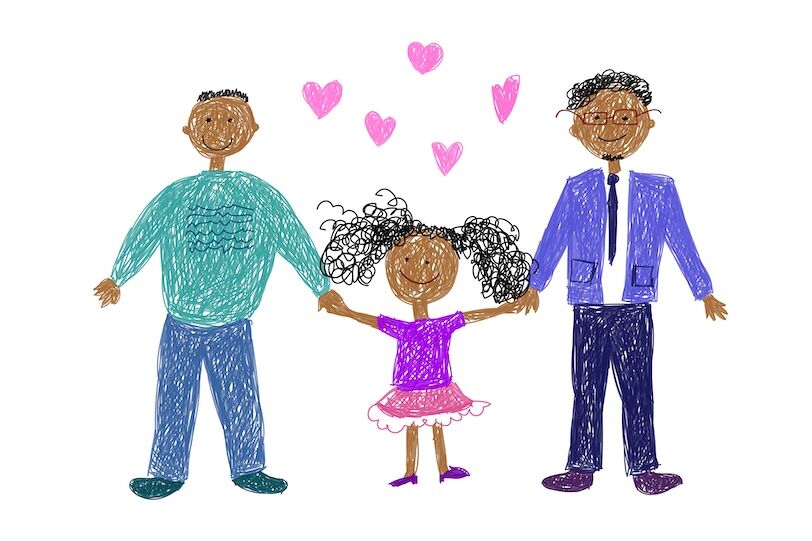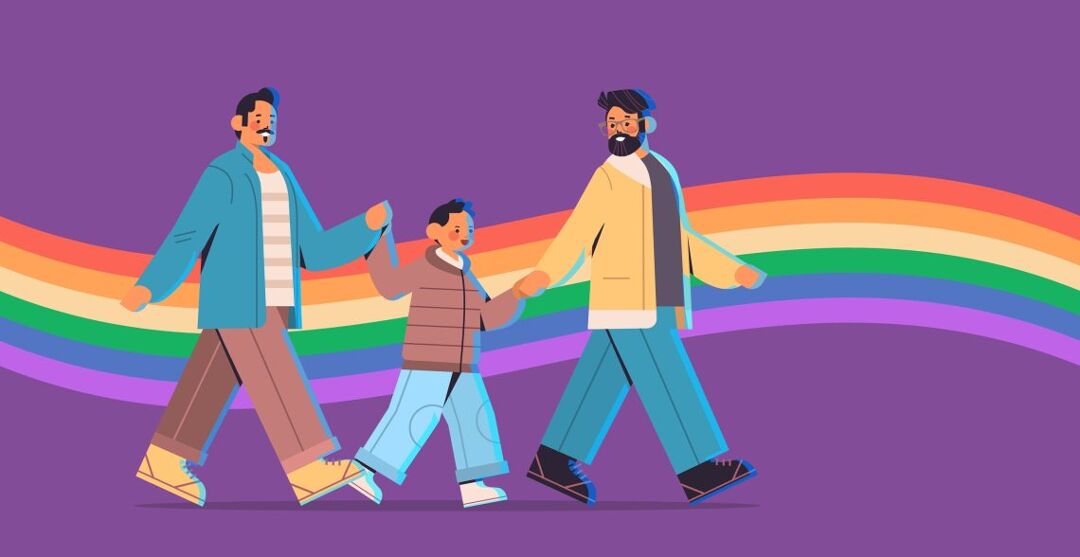
I’ve always dreamed of building a family — one rooted in love and the belief that chosen connections can be as profound as those bound by blood. My husband, Christopher, and I have spent countless hours envisioning what that family might look like, imagining the day we adopt a child who will know, without a doubt, that they are cherished and safe.
It’s a dream built not just on love but on the healing journeys that brought us together — a healing that began long before we met.
Related
Single gay dads are having a moment. TikToker José Rolón & his 3 children are drinking it in.
Rolón says there are some key differences between the straight & gay experience of raising kids solo. But stepping on Legos hurts like hell either way.
As a child, I sometimes felt my mother struggled with the sacrifices she was forced to make as a single parent. My parents were both divorced and remarried. Though I spent occasional weekends with my father, he was nonchalant, providing no discipline or emotional support. My mom’s second husband was emotionally volatile, self-absorbed, and battling addiction. Yet, despite all of this, my mother’s commitment to raising me never wavered.
Never Miss a Beat
Subscribe to our newsletter to stay ahead of the latest LGBTQ+ political news and insights.
Subscribe to our Newsletter today
I carry her strength with me every day, even as I reflect on the moments of difficulty. My own childhood unfolded in Dallas and Sherman, Texas, where my mother worked tirelessly to provide for me with very limited support.
Christopher’s story, though different in detail, mirrors mine in many ways. He was abandoned by his parents at a young age. Thankfully, his paternal aunt stepped in, providing him with the love and stability that helped him grow into the man I fell in love with. Like me, Christopher grew up knowing what it was like to carry the weight of loss and longing — but also how resilience could forge something stronger.
When we met, something clicked almost immediately. We quickly realized how much our lives mirrored one another, particularly in how our childhoods shaped the people we became. These parallels weren’t just a coincidence; they became the foundation of the life we built together. Through our shared experiences, we found not only love but also a shared determination to create a different kind of family—one defined by the kind of unconditional care we both longed for as children.
Christopher and I have often reflected on how tough our adolescence was, and those shared experiences shaped one of the biggest decisions of our marriage: adoption. We both know what it’s like to lack stability, and we want to give a young person the home we both wish we’d had.
Guidance, love, stability

The idea became real one crisp autumn night after our third-anniversary dinner. We were sitting outside a café, sipping espresso, when the conversation turned to the future. I mentioned wanting to adopt older kids, and Christopher smiled, saying he’d been thinking the same thing. Under the glow of string lights, we promised each other we’d make it happen.
Adoption represents so much more than expanding our family; it’s about breaking cycles of harm and creating a home where love is abundant and unconditional. Years ago, this vision would’ve felt impossible to me. At that time, my life was marked by heartbreak, violence, and a betrayal that left me questioning whether I’d ever find the love and peace I so desperately sought. But healing came in ways I never expected, and now, Christopher and I are ready to build the family we’ve both dreamed of — together.
We want to adopt someone between the ages of 12 and 18. Babies are adorable, but adolescence is when children desperately need guidance, love, and stability. Unfortunately, older children in the U.S. foster care system face significant barriers to adoption.
In 2021, only 29% of children adopted from foster care were age nine or older, despite the average age of children awaiting adoption being eight. More than 19,000 young people aged out of the foster care system that same year without finding a permanent family. The statistics are sobering: nearly half of those who age out are unemployed, and 71% earn less than $25,000 per year. Many face housing instability, and a substantial number experience homelessness shortly after leaving the system.
As two Black queer men, we feel a profound connection to the challenges faced by Black children in the foster care system. Black youth are disproportionately represented in foster care, comprising 23% of all children in the system, despite representing just 14% of the U.S. child population. They are also more likely to experience less stability, often facing multiple placements during their time in care. This persistent issue needs urgent attention.
Showing up

When I think about the challenges Black children face in foster care, I’m reminded of my own childhood and the moments I felt unseen. Christopher and I both know what it feels like to crave stability, safety, and unconditional love. We are determined to provide that for a child who might otherwise be overlooked.
Our journey is also shaped by our identity as a same-sex couple. Research has consistently shown that children raised by LGBTQ+ parents fare just as well as those raised by heterosexual parents. Studies even suggest that same-sex parents excel in fostering openness, communication, and emotional support within their families.
Same-sex couples are also seven times more likely to adopt or foster than their heterosexual counterparts. Often, LGBTQ+ parents step in where others won’t, adopting older children, LGBTQ+ youth, or those with special needs. As queer people, we’ve had to build our own chosen family from scratch — support systems created through love and dedication. It’s this lived experience that makes LGBTQ+ parents uniquely equipped to offer the same love and care to children who might feel forgotten or marginalized.
LGBTQ+ families also understand the power of creating safe spaces where identities can flourish. For Christopher and me, it’s not just about providing a home — it’s about offering acceptance, belonging, and unconditional love. Every child deserves that, especially those who’ve been told they don’t matter. This journey — our love story, our shared childhood scars, and our commitment to adoption — is a testament to care and choice. At its core, family isn’t about biology or perfection. It’s about showing up for one another when it matters most.
Christopher and I aren’t perfect, but we know the value of showing up. That’s what adoption means to us: showing up for a child when it feels like the world has given up. We haven’t yet taken any major steps beyond preparing our hearts for the future, as we are focused on advancing our careers and strengthening our financial foundation to ensure we can provide our future child with the best possible life.
If you’ve ever thought about adoption, consider the thousands of older children still waiting for families. Because every child deserves a chance to be seen, loved, and supported. And maybe, just maybe, we’ll build a family that heals us all in the process.
Subscribe to the LGBTQ Nation newsletter and be the first to know about the latest headlines shaping LGBTQ+ communities worldwide.